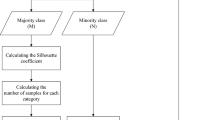Abstract
Credit scoring is an imbalanced binary classification problem, where the number of instances of bad customers is much less than that of good customers. Traditional classification algorithms may not give an effective performance while dealing with these imbalanced datasets, especially when classifying the minority class instances. To overcome the imbalanced problems, different undersampling and oversampling techniques have been proposed to reduce the majority class instances and oversample the minority class instances, respectively. In this paper, the clustering-based undersampling technique (CUTE) is proposed to tackle the imbalanced credit scoring problems. CUTE implements a new strategy to compute the representativeness of each member of the majority class subset. Here, the proposed model is compared with four traditional resampling techniques using two credit scoring datasets. Additionally, the performance of the proposed model consistently improves in different measures, such as accuracy, precision, recall, Fscore, and AUC.
Access this chapter
Tax calculation will be finalised at checkout
Purchases are for personal use only
Similar content being viewed by others
References
Lenka, S.R., Pant, M., Barik, R.K., Patra, S.S., Dubey, H.: Investigation into the efficacy of various machine learning techniques for mitigation in credit card fraud detection. Adv. Intell. Syst. Comput. 1176, 255–264 (2021). https://doi.org/10.1007/978-981-15-5788-0_24
Feng, S., Zhao, C., Fu, P.: A cluster-based hybrid sampling approach for imbalanced data classification. Rev. Sci. Instrum. 91(5), 055101 (2020). https://doi.org/10.1063/5.0008935
Yu, L., Zhou, R., Tang, L., Chen, R.: A DBN-based resampling SVM ensemble learning paradigm for credit classification with imbalanced data. Appl. Soft Comput. J. 69(71433001), 192–202 (2018). https://doi.org/10.1016/j.asoc.2018.04.049
Błaszczyński, J., Stefanowski, J.: Neighbourhood sampling in bagging for imbalanced data. Neurocomputing 150, 529–542 (2015). https://doi.org/10.1016/j.neucom.2014.07.064
Abdi, L., Hashemi, S.: To combat multi-class imbalanced problems by means of over-sampling techniques. IEEE Trans. Knowl. Data Eng. 28(1), 238–251 (2015). https://doi.org/10.1109/TKDE.2015.2458858
Lin, W.C., Tsai, C.F., Hu, Y.H., Jhang, J.S.: Clustering-based undersampling in class-imbalanced data. Inf. Sci. (Ny) 409–410, 17–26 (2017). https://doi.org/10.1016/j.ins.2017.05.008
Crone, S.F., Finlay, S.: Instance sampling in credit scoring: an empirical study of sample size and balancing. Int. J. Forecast. 28(1), 224–238 (2012). https://doi.org/10.1016/j.ijforecast.2011.07.006
Tsai, C.F., Lin, W.C., Hu, Y.H., Yao, G.T.: Under-sampling class imbalanced datasets by combining clustering analysis and instance selection. Inf. Sci. (Ny) 477, 47–54 (2019). https://doi.org/10.1016/j.ins.2018.10.029
Barua, S., Islam, M.M., Yao, X., Murase, K.: MWMOTE—majority weighted minority oversampling technique for imbalanced data set learning. IEEE Trans. Knowl. Data Eng. 26(2), 405–425 (2014). https://doi.org/10.1109/TKDE.2012.232
Anand, A., Pugalenthi, G., Fogel, G.B., Suganthan, P.N.: An approach for classification of highly imbalanced data using weighting and undersampling. Amino Acids 39(5), 1385–1391 (2010). https://doi.org/10.1007/s00726-010-0595-2
Li, Q., Yang, B., Li, Y., Deng, N., Jing, L.: Constructing support vector machine ensemble with segmentation for imbalanced datasets. Neural Comput. Appl. 22(S1), 249–256 (2013). https://doi.org/10.1007/s00521-012-1041-z
Sun, Z., Song, Q., Zhu, X., Sun, H., Xu, B., Zhou, Y.: A novel ensemble method for classifying imbalanced data. Pattern Recognit. 48(5), 1623–1637 (2015). https://doi.org/10.1016/j.patcog.2014.11.014
Author information
Authors and Affiliations
Corresponding author
Editor information
Editors and Affiliations
Rights and permissions
Copyright information
© 2022 The Author(s), under exclusive license to Springer Nature Singapore Pte Ltd.
About this paper
Cite this paper
Lenka, S.R., Bisoy, S.K., Priyadarshini, R., Nayak, B. (2022). Representative-Based Cluster Undersampling Technique for Imbalanced Credit Scoring Datasets. In: Roy, S., Sinwar, D., Perumal, T., Slowik, A., Tavares, J.M.R.S. (eds) Innovations in Computational Intelligence and Computer Vision . Advances in Intelligent Systems and Computing, vol 1424. Springer, Singapore. https://doi.org/10.1007/978-981-19-0475-2_11
Download citation
DOI: https://doi.org/10.1007/978-981-19-0475-2_11
Published:
Publisher Name: Springer, Singapore
Print ISBN: 978-981-19-0474-5
Online ISBN: 978-981-19-0475-2
eBook Packages: Intelligent Technologies and RoboticsIntelligent Technologies and Robotics (R0)




